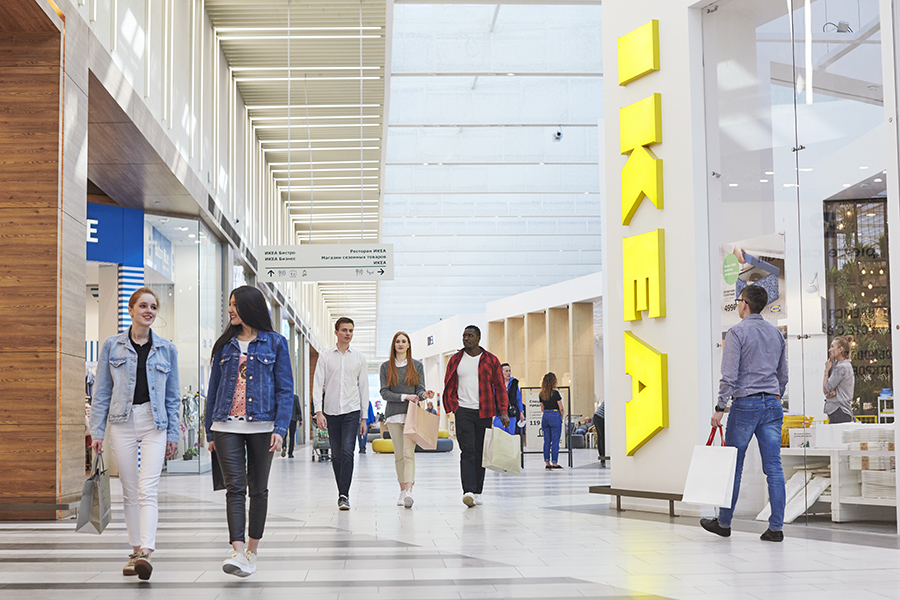
Ingka Shopping Centre, Ekaterinburg
As the world has changed over the last few months since the COVID-19 pandemic, proximity, convenience and sustainability are the future needs of consumers in their everyday life. Therefore, mixed-use developments are being relooked to be relevant to these future needs, while creating authentic experiences. While people are now preferring virtual over in-person interactions, this might not be a long-term solution. What would be long-term is the need for people to find everyday solutions within an integrated, mixed-use space.
Even before the COVID-19 pandemic, relevance of mixed-use developments was on the rise. People were looking for integrated spaces to socialise over food, entertainment and community-centric activities, as well as work. All of this within close proximity to home.
Also read: Mixed-use developments revitalising everyday spaces
Creating integrated mixed-use destinations
Ikea’s retail real estate arm, Ingka Centres has been committed to creating such integrated mixed-use spaces, promoting a better everyday life for people. It is investing heavily to create mixed-use community destinations – or ‘meeting places’ and ‘city centre’ – with retail, F&B, entertainment, as well as commercial, healthcare, educational and other facilities.
“Our meeting places are developed keeping people at the heart. The starting point is really understanding their needs and aspirations; where they want to spend time, socialise, shop, work and live. This will become even more crucial now, building closer to home, safe, convenient and engaging meeting places. In addition, sustainability is pivotal in our strategy in the way we build how our retail partners operate. As such, we will become more relevant in our retail partners’ omnichannel journey, which is now non-negotiable to offer a great customer journey,” states Vasco Santos, global sales & leasing manager for Ingka Centres.

Vasco Santos, global sales & leasing manager for Ingka Centres
Ingka Centres has invested €1 billion to create a mixed-use project in Shanghai, China. To be completed in 2022, the development will house a small Ikea store, 300 retail concepts, a public space and a roof garden, a Scandinavian-styled street and five office towers. While in the US, Ingka Centres is planning to bring Ikea stores closer to the city centres through its developments.
“Think about it – it is crucial for retailers to minimise logistics costs while optimising the last-mile experience, and consumers are seeking sustainable ways of delivery. To be able to do so, proximity plays a big role. Our city centre concepts are able to facilitate swift and sustainable last-mile delivery, owing to proximity to where people shop and live,” Santos explains.
“Even before the COVID-19 pandemic, we had made significant investments to create meaningful mixed-use meeting places, with a big part of the investment allocated towards creating more city centre concepts,” he continues. “The crisis has strengthened this vision, as people are looking for proximity and convenient ways of shopping and sustainable way of living. In addition, these mixed-use developments will be built flexibly, so that spaces can be repurposed after a while without making too many structural changes.”
Digitalisation boost is an opportunity
There has been an inevitable boost in digitalisation over the past few months, which Ingka Centres sees as an “opportunity.” It is a classic opportunity to rethink and strengthen collaboration between Ingka’s brick-and-mortar spaces and its retail partners’ digital assets.
“The need for brick-and-mortar spaces to become more experience-laden and interactive was felt even before the current crisis. Instead of opening more stores, our retail partners were already looking at creating better stores that are experience-driven, smart and interactive,” Santos shares. “The pandemic has hastened the journey to take this omnichannel experience to the next level, by accelerating digitalisation efforts.”
Some of Ingka Centre’s retail partners have recorded less growth online during the lockdown when stores were closed. “This points towards the relevance of physical retail and how online complements the experience,” he adds. “At the same time, we are creating online platforms to enhance engagement between our retail partners and consumers.”
Deepening tenant-landlord relationship
Digitalisation isn’t stunting the growth of retail real estate. It rather has the potential to deepen the tenant-landlord relationship. “The future isn’t about us having the space to rent to retail partners. It is more about collaboration and co-creation of new business models to support a delightful customer journey. It is also about leveraging data to offer a curated shopping experience.”
Further, as the COVID-19 related lockdown became imminent, Ingka Centres clearly communicated to its retail partners about a complete waiver of rent and service charges during the period of closure of the stores and meeting places.
“Even though the pharmacies and groceries were trading and we had to keep the buildings open, we had a clear mandate to support our tenants. At Ingka Centres, we have always looked at building long-term relationships as opposed to short term benefits. As retail real estate is reopening, the idea is to get back to business together without leaving our retail partners behind. It is crucial to ensure full occupancy as business reopens to be able to fulfil the needs of our visitors,” he concludes.
For all the latest retail news from the Middle East, follow us on Twitter and LinkedIn, like us on Facebook and subscribe to our YouTube page.
You must be logged in to post a comment.